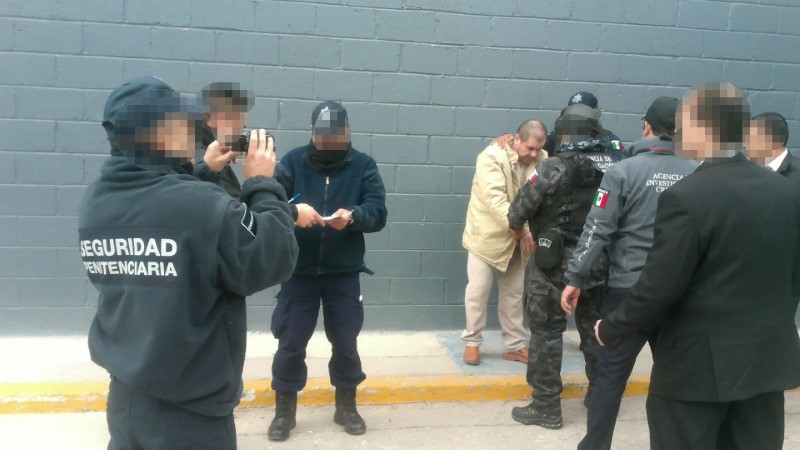By Gabriel Stargardter
MEXICO CITY (Reuters) - Irrespective of whether Mexico's decision to extradite drug kingpin Joaquin "Chapo" Guzman aimed to honor outgoing U.S. President Barack Obama or appease his successor, Donald Trump, law enforcement from both countries say it bodes well for security cooperation.
Guzman, the feared boss of the Sinaloa cartel who shot to international stardom after two jailbreaks, was extradited from a prison in northern Mexico to New York on Thursday, the eve of Trump's inauguration.
While some Mexican government officials believed Guzman's removal served as a valediction for Obama's presidency, others saw it as an opening gambit in what are likely to be fraught trade negotiations with a seemingly unfriendly Trump administration.
But current and former law enforcement officials on both sides of the border said the move would boost security cooperation and could even upgrade relations.
"What happened today is something that's a victory for both Mexico and the United States," said Leo Silva, who worked for the Drug Enforcement Administration in the northern Mexican city of Monterrey until 2015. "This will obviously improve things."
According to a senior U.S. law enforcement official based in Mexico, both U.S. and Mexican security forces were already "three steps ahead" in identifying the next Chapo.
"From the Mexico side, they work with us a lot, a lot more than people think," said the official, who was not authorized to speak with press. "They think they're going to get more support from us, they're on line and I really don't see a huge change. If anything, an improvement."
ROCKY HISTORY
Security cooperation has not always run smoothly, and Mexico, with its proud, nationalist leanings, has often chafed at what it views as U.S. intrusion in its affairs.
Silva said after Vicente Fox became president in 2000, Mexico gave less access to U.S. law enforcement. However, Fox's successor, Felipe Calderon, was more willing to accept U.S. help, and Silva said he could even pick up the phone and call then-Attorney General Marisela Morales.
The election of the Institutional Revolutionary Party's Enrique Pena Nieto in 2012 represented a fresh set-back, with U.S. officials initially kept at arm's length and a new attorney general appointed, Jesus Murillo Karam, who Silva called "standoffish."
Nonetheless, after a rocky start, relations soon warmed and U.S. intelligence, particularly the U.S. Marshals who track fugitives, became a key component in many of the high-profile busts that have taken place under Pena Nieto.
"It's similar to what we were doing and receiving under Calderon, except that this current administration doesn't talk about it or publicize that they're working together," said one former DEA agent who worked on Mexican cases.
After the victory of Trump, who has threatened to rip up the North American Free Trade Agreement, slap tariffs on U.S. firms manufacturing in Mexico and deport millions of illegal immigrants, some speculated years of hard-won security cooperation would fray as Mexico sought to show it wouldn't be pushed around by the brash New Yorker.
But behind the bluster, law enforcement officials from both countries said that was unlikely to happen, and that the situation could even improve if Trump, a law-and-order Republican who has repeatedly voiced his support for police and soldiers, focused more on combating Mexican cartels.
"The crime and the gangs and the drugs that have stolen too many lives and robbed our country of so much unrealized potential," Trump said during his inauguration speech on Friday. "This American carnage stops right here and stops right now."
A Mexican anti-corruption official swatted away the notion that Mexico could shut out the United States on security issues.
"The government is going to continue the policy that it has always had of combating organized crime," he said.
CARROT OR STICK?
Vito Guardino, who worked for the DEA for 30 years, said the U.S. government used extradition as a yardstick to measure other countries' willingness to cooperate.
But if the United States didn't get what it wanted, he said, it found ways of forcing other nations to play ball, a reality unlikely to be lost on Mexico, which is heavily reliant on U.S. trade.
For example, Guardino said that when Colombia stopped extraditing drug traffickers to the United States in the late 1980s, the U.S. government used a carrot-and-stick approach, threatening sanctions while drawing up the multibillion-dollar Plan Colombia.
By that metric, Chapo's removal represents a calculated show of faith on the part of Mexico, which has also signaled to Trump's team it is open to reinforcing the northern border to curb drug smuggling and illegal migration.

The high-stakes political tensions were, however, only one way of looking at things, Guardino and many others said. Relationships with foreign law enforcement officials often take years to build and rely on trust in dangerous circumstances.